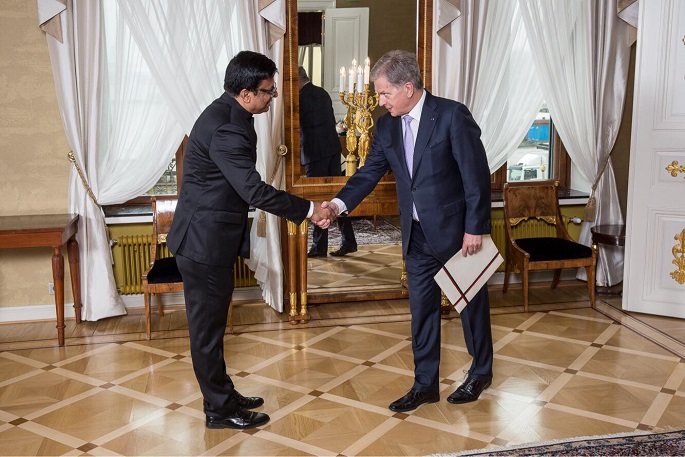Finland-Bangladesh ties getting tighter
Says Bangladesh Ambassador Nazmul Islam
Published : 28 Apr 2018, 20:05
Finland and Bangladesh are committed to deepen bilateral relations, particularly to boost mutual trade and commerce, said Ambassador Extraordinary and Plenipotentiary of Bangladesh to the Nordic Countries Md. Nazmul Islam.
In an exclusive interview to the Daily Finland, the Bangladesh envoy, who presented his credentials to President Sauli Niinistö on April 25, said, “I already have held a couple of meetings with top foreign ministry officials of Finland and have come to understand that they are very interested in and aware about the developments in Bangladesh.”
“Bangladesh has a middle class population of around 50 million which, in their opinion, is a perfect size for Finnish entrepreneurs and business market,” added Islam, who sits in the Embassy of Bangladesh in Stockholm and is also in charge of Bangladesh’s diplomatic affairs in Finland, and Norway. Before taking up this charge, Islam had worked as a director general at the foreign ministry of Bangladesh.
Ambassador Islam said both Finland and Bangladesh are now working in earnest towards building a much stronger relationship. As part of the process, he said, Finnish Ambassador to India Nina Vaskunlahti, who also in charge of Bangladesh, has promised to visit Dhaka four times a year. “I, too, have planned to do the same to develop cooperation with all the Finnish ministries,” he added.
The Bangladesh envoy said, at the beginning of this month, the Finnish and Bangladesh authorities held a joint-meeting termed political consultation in Dhaka. “We have agreed that it will be held annually either in Dhaka or in Helsinki. Next year, the consultation is scheduled for Helsinki. The meeting’s purpose is to discuss ways and means of increasing cooperation, promoting trade, and finding potential trade opportunities, besides deliberating on other bilateral issues.”
“As per our findings so far, we can have expertise from Finnish innovations such as in power generation, renewable energy, waste management, and clean technology. On the other hand, Finland at the moment is mostly importing readymade garments from Bangladesh; but it can also benefit from our pharmaceuticals and jute industry,” Islam said, adding that they have already started working in these areas and hopefully will see a soaring bilateral trade line in the future.
Islam also noted that any rise in trade of jute products and clean technology will not only reinforce bilateral commercial relations but also help us play a positive role in regards to climate change, the issue on which Finland and Bangladesh are already working together.
On a query about the traditional pattern of the Nordic people moving mainly in and around Europe, scarcely reaching as far out as the South Asian countries, the envoy smiled and quipped, the situation has started to change.
Business and trade between the two countries are on a rise and evidently going to take the centre stage of the relationship, said Islam. Last year, the bilateral trade amounted to more than 200 million euros, with Bangladesh exporting about 121 million euros and Finland about 110 million euros – a situation that he termed win-win.
The ambassador on behalf of his country expressed gratitude for Finland’s support to the Independence War of Bangladesh. “The country [Finland] has always been supportive to us politically and economically and also cooperating with us regionally and internationally. Most recently, Finland has been supporting us financially on the Rohingya refugee issue,” said Islam, adding that driven by escalating violence in Myanmar, a fresh influx of about 700,000 Rohingya refugees into Bangladesh has been registered since 25 August 2017.
Although it was a group credential presentation ceremony on April 25, the Bangladesh ambassador did have a few moments to exchange views with President Niinistö which he said were really pleasant. “He [Niinistö] praised Bangladesh highly for sheltering one million Rohingya refugees and mentioned Finland’s support given to the Rohingya people both unilaterally and through EU. He was also keen to promote trade and increase cooperation between the two countries.”


